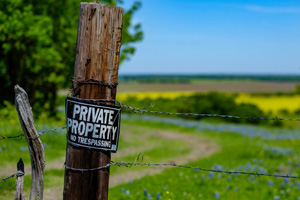Homeowners in New Mexico may share some of the liability for guests injured on their properties, but what if the injured person was not given permission to be on the private property in the first place? Whether it is a criminal who has broken into your home or a trespasser who has mistakenly found their way onto your property, it is important to know what your legal responsibilities are if an uninvited guest is injured on your property. Specific legal exceptions within the criminal trespass statute may apply, such as when landowners grant access to their properties for activities like hunting or fishing.
New Mexico’s self-defense law, including the use of deadly force, can impact a property owner’s liability in cases involving intruders.
If you have questions about your liability as a property owner in New Mexico or need qualified legal representation after an accident, we can help. Attorney Paul M. Dominguez is known for his knowledge, client prioritization, and complete focus on litigating cases, including those involving premises liability.
Understanding Trespassing and Premises Liability Laws for Buildings, Structures, Trees, and Shrubs in New Mexico
Trespassing generally refers to the act of entering or remaining on someone else’s property without permission. In New Mexico, trespassing is considered a civil offense, and property owners have certain rights and protections when it comes to dealing with trespassers. While property owners are expected to take reasonable measures to ensure the safety of lawful visitors, they must also address hazards in a timely manner to avoid liability. Property owners are expected to act as reasonable person in ensuring the safety of lawful visitors, but their legal obligations are different when it comes to trespassers.
Criminal trespass consists of knowingly entering or remaining on private or unposted lands without permission from the landowner or occupier. This includes lands owned, operated, or controlled by the state or its subdivisions without consent from the custodian thereof. According to subsection a b of the relevant House Bill, such consent must be clearly communicated, and failure to adhere to these stipulations can result in legal ramifications.
If an individual destroys any part of the real estate or its improvements, such as buildings or natural features, they are committing a misdemeanor and may be liable for civil damages equal to double the value of the damage caused. Evidence to the courts is crucial in establishing notice of no consent to enter unposted private property. Additionally, if someone knowingly removes ‘no trespass’ signs, they can face legal consequences ranging from a petty misdemeanor to a harsher misdemeanor. Limits on access are often communicated through verbal warnings or posted signs at every roadway or apparent way of accessing privately owned land. Unauthorized entry or remaining without being permitted can lead to a trespassing charge, especially on unposted lands.
The “Attractive Nuisance” Doctrine and Its Relation to Crime
One important legal concept that can affect a property owner’s liability for injuries to trespassers is the “attractive nuisance” doctrine. This doctrine recognizes that certain conditions or objects on a property may attract children, who, due to their young age and inability to understand potential risks, may trespass and get injured. An attractive nuisance can lead to a premises liability case if a child is injured.
Attractive nuisances may include but are not limited to:
- Abandoned structures
- Animals
- Construction Equipment
- Playground equipment
- Ponds and fountains
- Skateboard ramps
- Swimming pools
- Trampolines
In New Mexico, if you have an attractive nuisance on your property, you may be held liable for any injuries sustained by a child trespasser. The key factors that determine liability in such cases include whether the property owner was aware of the dangerous condition, whether the owner could foresee that children might trespass, and whether the owner took reasonable steps to prevent access to the attractive nuisance or mitigate the potential danger.
Liability for Injuries to Adult Trespassers
When it comes to injuries sustained by adult trespassers, the legal landscape becomes more complex. In New Mexico, property owners, including those of businesses, generally owe a lesser duty of care to adult trespassers compared to lawful visitors or invited guests. While you cannot intentionally cause harm to trespassers, you are not obligated to ensure their safety or warn them about potential dangers on your property.
However, there are exceptions to this general rule. If you are aware of the presence of adult trespassers on your property, you may have a duty to warn them of any known dangers or hazardous conditions that could cause serious harm. A property owner’s negligence can lead to liability if they fail to warn known trespassers of such dangers. Additionally, if you act recklessly or engage in willful misconduct that directly causes harm to a trespasser, you may be held liable for their injuries. Self-defense can also be a factor in cases where the property owner uses force against an intruder.
Premises Liability and Trespasser Injuries
Premises liability laws in New Mexico require property owners to maintain a safe environment and warn visitors of potential hazards. However, the duty of care owed to trespassers is generally lower than that owed to lawful visitors or invited guests. Property owners are not obligated to ensure the safety of adult trespassers or warn them about potential dangers on their property.
That said, there are notable exceptions to this rule. If a property owner is aware of the presence of trespassers, they may have a duty to warn them of known dangers or hazardous conditions that could cause serious harm. Additionally, if a property owner engages in reckless behavior or willful misconduct that directly results in harm to a trespasser, they may be held liable for the injuries sustained. This nuanced approach underscores the importance of understanding the specific circumstances surrounding each case.
Protecting Your Rights and Reducing Liability as a Property Owner in New Mexico: Hunting, Fishing, or Trapping Considerations
Dealing with personal injury incidents on your property can be overwhelming and legally complex. Property owners may face liability claims for injuries on their property. If you had an intruder suffer a personal injury on your property in New Mexico, we can help. At Dominguez Law, we work with compassion and aggression to safeguard your interests and help you make informed decisions regarding your legal obligations. An insurance company may be involved in handling liability claims and negotiating settlements. Property owners may need legal representation to handle a premises liability claim.
In New Mexico, there are specific legal implications and exemptions related to hunting, fishing, or trapping on private property. Individuals authorized to access private land for these activities may be exempt from trespass laws. However, unauthorized hunting, fishing, or trapping can lead to criminal trespass charges. Additionally, issues of big game are addressed through the publication requirements for the ‘Big Game Hunt Proclamation’ by the department of game and fish, which helps regulate access to hunting areas and prevent illegal activities.
To schedule a free consultation to discuss your legal responsibilities and rights as a property owner in New Mexico, call our office at [(505) 499-5524](tel: (505) 499-5524), or you may reach out to us online via our convenient contact form. Se habla español. Compensation for medical bills is an important aspect of premises liability claims.
Consequences of Trespassing and Liability
Trespassing in New Mexico can lead to serious consequences, both criminal and civil. Trespassing is considered a crime, and those found guilty can face fines, imprisonment, and other penalties. Beyond criminal charges, property owners may also face civil liability for injuries sustained by trespassers, particularly if they fail to take reasonable measures to ensure the safety of their property.
In cases where a trespasser is injured, the property owner may be held liable for damages, including medical expenses, lost wages, and pain and suffering. The extent of the property owner’s liability will depend on various factors, such as their awareness of the trespasser’s presence, the steps they took to prevent access to the property, and whether their actions were reckless or constituted willful misconduct.
To mitigate the risk of liability, property owners should take proactive steps to prevent trespassing. This can include posting “No Trespassing” signs, installing fencing or other barriers, and addressing any attractive nuisances that may draw children onto the property. Understanding the attractive nuisance doctrine is crucial, as it recognizes that certain conditions or objects on a property, such as structures, trees, shrubs, or ponds, may attract children and lead to premises liability cases.
If a trespasser is injured on your property, it is important to seek legal representation to handle any premises liability claims that may arise. An experienced attorney can help navigate the complexities of premises liability law, ensuring that your rights are protected and that you are adequately prepared to address any legal challenges.
Q&A For Trespassing and Premises Liability Laws
When is possessing written permission required to access private property?
Written permission is required for activities like hunting, fishing, or trapping on private property in New Mexico. This ensures compliance with trespassing laws and protects landowners’ rights. Without written consent, individuals risk legal consequences, including criminal trespass charges.
What does “control of the land” mean for liability purposes?
Control of the land refers to a property owner’s responsibility to manage hazards on their property. Even with control, liability for trespasser injuries is typically lower than for lawful visitors unless the owner acts recklessly or negligently.
How does New Mexico law address trespassing by children?
The attractive nuisance doctrine holds property owners responsible for injuries to child trespassers caused by enticing hazards like pools or trampolines. Owners must take reasonable steps to secure such hazards if they foresee children entering their property.
What steps can landowners take to protect themselves from trespassing claims?
Landowners can post “No Trespassing” signs, install fencing, and address attractive nuisances. Possessing written permission from visitors engaged in activities like hunting or fishing further ensures compliance with trespassing laws and reduces liability risks.



